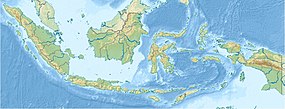Masiwang River
| Masiwang River Sungai Masiwang, Wae Masiwang, Wae Marsimang | |
|---|---|
 Location of river mouth | |
| Location | |
| Country | Indonesia |
| Province | Maluku |
| Physical characteristics | |
| Source | |
| • location | Seram Island |
| Mouth | Banda Sea |
| Basin size | 1,189.338 km2 (459.206 sq mi)[1] |
Masiwang River is a river of eastern Seram Island, Maluku province, Indonesia, about 2700 km northeast of the capital Jakarta.[2]
Hydrology[]
The Masiwang River flows through a wide valley, and is typically shallow, with a significant amount of sediment load.[3] The watershed area of Masiwang is the largest in the eastern part of Seram island with an area of 1189.338 km².[1] It flows into the sea on the southeast coast of Seram, between , the eastern point of , and , forming a delta.[4] The Masiwang and Seti languages are spoken in the vicinity.[5]
Geography[]
The river flows in the eastern area of Seram island with predominantly tropical rainforest climate (designated as Af in the Köppen-Geiger climate classification).[6] The annual average temperature in the area is 23 °C. The warmest month is March, when the average temperature is around 24 °C, and the coldest is July, at 21 °C.[7] The average annual rainfall is 2814 mm. The wettest month is July, with an average of 422 mm rainfall, and the driest is October, with 95 mm rainfall.[8]
See also[]
References[]
- ^ Jump up to: a b (in Indonesian) Happy Mulya. "Studi Rasionalisasi Jaringan Hidrologi Pulau Seram Provinsi Maluku". Jurnal MKTS: Jurnal Ilmu dan Terapan Bidang Teknik Sipil Vol. 20 No. 1 Juli 2014. pp. 71-82.
- ^ Wae Masiwang at Geonames.org (cc-by); Last updated 2013-06-04; Database dump downloaded 2015-11-27
- ^ Pohjakas, K.; Livingston, E.; Lubis, Y. M. (1976). Water resources in East Indonesia. Republic of Indonesia, Ministry of Public Works and Electric Power, Directorate General of Housing, Building, Planning, and Urban Development, Directorate of City and Regional Planning. pp. 37–8.
- ^ East Indies Pilot: Islands eastward of Celebes and Timor, including New Guinea and Louisiade Archipelago. U.S. Hydrographic Office. 1923. p. 170.
- ^ Pacific Linguistics. Department of Linguistics, Research School of Pacific Studies, Australian National University. 1986. p. 125.
- ^ Peel, M C; Finlayson, B L; McMahon, T A (2007). "Updated world map of the Köppen-Geiger climate classification". Hydrology and Earth System Sciences. 11: 1633–1644. doi:10.5194/hess-11-1633-2007. Retrieved 30 January 2016.
- ^ "NASA Earth Observations Data Set Index". NASA. 30 January 2016.
- ^ "NASA Earth Observations: Rainfall (1 month - TRMM)". NASA/Tropical Rainfall Monitoring Mission. 30 January 2016.
Coordinates: 3°26′35″S 130°46′38″E / 3.44306°S 130.77722°E
- Rivers of Seram Island
- Rivers of Indonesia


